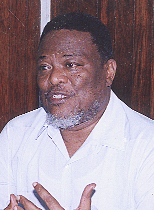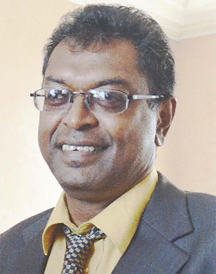Government continues to defend its decision to award the road construction contract for the Amaila hydro project to Fip Motilall in the face of heavy criticism yesterday from Opposition members of a panel during a televised debate on the National Communications Network, the first in a seven-part series addressing the issue of corruption.
In addition to knocking Government over awarding Motilall the contract and saying that he had been favoured by the Government with contract extensions, the Opposition criticised the Government’s handling of the issues in the initial stages, for shrouding them in cover-up and noted that it was a visit by a team from Sithe Global, the project developer, that gave the Opposition an opportunity to learn about the intricacies of the project.

The moderator of the debate was the University of Guyana’s Al Creighton and the panellists comprised Carl Greenidge of A Partnership for National Unity (APNU), Khemraj Ramjattan of the Alliance For Change (AFC), Neil Chand, President of the Guyana Manufacturing and Services Association on one side and Prime Minister Sam Hinds, former Minister Manzoor Nadir and CEO of Guyana Power and Light Bharat Dindyal on the other side.
During the breaks in the hour-long session, there was a stage-managed social media interaction called the Feedback Desk which saw questions particularly critical of the Opposition being posed through Facebook and by email for the attention of the Government side of the panel.
Leader of the AFC, Ramjattan said that the entire Amaila project commenced in a way that led it to be characterised as one filled with corruption from the outset. “Take for example the road that was supposed to be built by Fip Motilall and Synergy…US$15 million, lots of money from the coffers of this country down the drain,” he said. Government subsequently terminated Motilall’s contract and moved against his heavy duty equipment in a bid to recoup monies owed.
“What we have today is a project that because of the nature of the start…a person who is obviously not qualified to make any road getting the contract,” he said.
“We are of the view just like the Inter-American Development Bank (IDB) that we have to look after alternative arrangements assuming there is a dry season and the reservoir around the Kuribrong River does not have the capacity to supply electricity,” he said. Ramjattan also expressed concern about the cost of the project and wondered whether the final price tag could change.
Greenidge said that the issue of Amaila is not primarily one of corruption. “The issue of Amaila has primarily to do with the mode of decision making of the Government,” he said. “Amaila is the largest investment project that we are likely to undertake in the recent times. It is extremely large relative to our GDP and therefore it is very important that [we carefully examine] a project of this size which can impact so heavily on our indebtedness, which can impact positively or otherwise on the cost of purchasing of electricity and therefore the viability of enterprises,” he said. He said that the manufacturing sector in Guyana has already been killed off because of the high electricity costs.

“It is very important that this investment is one that is informed by the best information available, by defensible decision making processes and it is undertaken in a context of maximum transparency,” he said. “What has caused the project to be controversial is the secrecy surrounding many of the contracts,” he said. “There is the issue of the illegal award of contracts to Motilall and his company,” he said, mentioning too the sequential award of contracts for the hydro project in 2004, 2006 and 2008 and then the contract for the road in 2010,” he said.
Offered a chance to speak, former Government Minister Nadir said that there was transparency in the contract awarded to Synergy and that this company’s bid was the lowest evaluated bid, hence the award.
Prime Minister Hinds said that the project was transparent and that there were many persons exploring various sites of interest for hydropower development in the country. “Fip Motilall was one of those persons interested. He started doing some work, taking it forward from the feasibility study position and by 2003 he had a developer financial arrangement but at that time when oil prices were still low, the outward prices we would have had to pay at that time would have been higher than the payments for oil,” he said. Hinds said that with projects of this nature it is not unusual for someone to commence the project, run with it for a while and then seek partners with financing to eventually take it over the finish line. He said that it is in such a manner that Motilall handed over the hydro project to Sithe Global sometime around 2007-2008.
“I think we need to separate that part from the road part. He did bid. It was an open process,” the PM said.
Ramjattan said that despite the fact that Synergy’s bid would have been the lowest, it was prudent to check on the ability and capacity of that company to meet its contractual obligations to build the road. “We knew from all that was going on at that time and from all the work especially by the Kaieteur News checking out the offices of Synergy… [But] the whole bubble burst when Fip Motilall and Synergy couldn’t produce, and that was the proof of the pudding,” Ramjattan said.
“He only got paid for work done,” Hinds interjected. “Whatever. You awarded him a contract for US$15 million for which he has absolutely no capacity. [Motilall] was a favourite because he got an interim licence and 11 times he got extensions for the licence,” said Ramjattan in response to Hinds.
Greenidge dismissed the suggestion by the Government that because it is such an important and big project one must go ahead with it inevitably. “It is because it is large that you have to pay special attention to it. The problems associated with this contract are the same problems that will face us in other areas. We have right now the second largest project after this one in which we have invested state funds and that is the Skeldon (sugar) plant and that has gone wrong.
So don’t let us believe that simply by being nice to each other and recognising the importance of the investment it will work. It will work if you ensure that the things that should be done are done diligently,” he said.




